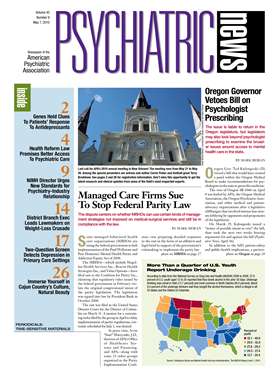Enactment of the new health care reform law in March was celebrated by mental health advocates, who believe that many of its elements will benefit people with varying severities of psychiatric illness.
Among the signature features of the law is a ban on the use of preexisting-condition exclusions and other forms of discrimination based on health status by private health insurers. Use of such exclusions has kept some people with mental illness or their dependents from obtaining coverage in the individual insurance market.
“Doing away with [such exclusions] is important for all people, but especially for people with mental illness,” APA President Alan Schatzberg, M.D., told Psychiatric News.
Until the ban on the use of preexisting conditions goes fully into effect in 2014, the law creates a temporary insurance program with financial assistance for people with preexisting conditions who have lacked insurance for at least six months.
Other limitations on insurers include bans on the use of lifetime or annual caps on the dollar value of benefits beginning in 2014. Some people with serious mental illness exceeded their caps due to their need for costly inpatient care or because they also suffered from expensive-to-treat coexisting nonmental illnesses. Until this provision becomes effective, the health care overhaul restricts annual limits that private insurance plans can impose to those set by the secretary of Health and Human Services.
Another insurance change will require plans to allow young adults up to age 26 to join their parents' policies if they don't have access to an insurance plan on their own. This provision will benefit young adults struck by the onset of mental illness in their early 20s.
These insurance improvements are “particularly notable given that 4 of the 10 leading causes of disability in the United States are mental disorders, and 87 percent of Americans cite lack of insurance coverage as the top reason for not seeking mental health services,” Laurel Stine, director of federal relations at the Bazelon Center for Mental Health Law, told Psychiatric News.
High-Risk Pools Boost Access
The health care overhaul should especially benefit people with mental illness who are not in the group-insurance market.
The law requires states to set up insurance exchanges by 2014 where individuals and small businesses can shop for standardized insurance packages that include mental health care. As an interim measure until the exchanges are established, high-risk pools will be established by next month to cover adults with preexisting conditions.
The new benefits will be accompanied by new responsibilities for both individuals and employers. For example, virtually all Americans must purchase health insurance. However, both low-income and middle-income Americans will be eligible for significant subsidies.
Additionally, beginning in 2014, all employers with 50 or more workers must offer health insurance to employees; otherwise, they must pay a penalty based on the number of employees who are uninsured.
Medicaid Changes Coming
Under the health care overhaul, Medicaid will cover 16 million more beneficiaries beginning in 2014. The expansion is expected to significantly affect people with serious mental illness, who are more likely than the general population to have low incomes due to their illness. Medicaid is already the single largest payer for mental health care in the nation. Individuals and families with incomes of up to 133 percent of the federal poverty level (FPL) will be eligible for Medicaid, instead of the current system that restricts eligibility to specific low-income groups, such as pregnant women. (For 2010, the FPL is $22,050 for a family of four.)
Another Medicaid change will remove the exclusion of coverage for certain medications beginning January 1, 2014. Those drugs include smoking-cessation treatments, barbiturates, and benzodiazepines.
Psychiatric patients will benefit from a key Medicare change that will reduce the so-called doughnut hole that kicks in after beneficiaries reach a certain level of spending for their prescription medications. Beginning this year, Medicare patients whose prescription expenses fall within the doughnut hole ($2,830 to $4,550 for 2010) will receive a $250 rebate. Rebate increases over the next 10 years will lower the beneficiary co-insurance rate for this coverage gap to the standard level for other Medicare-covered medications.
